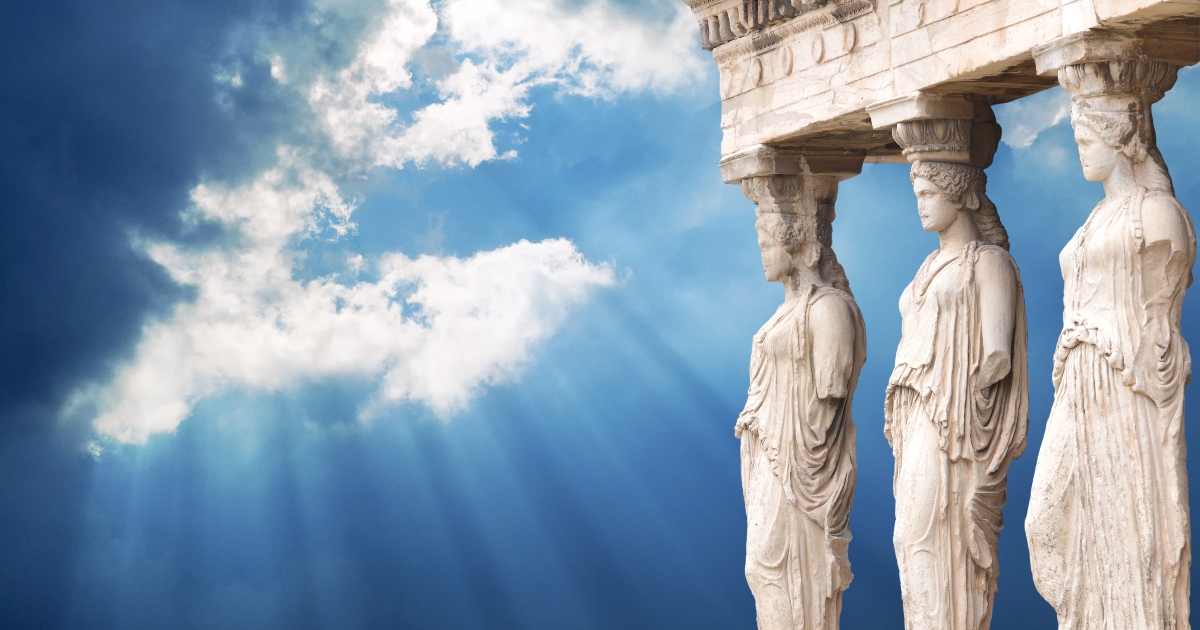
24 Sep Greek Goddesses
Most of us are well aware of the heroics of the ancient Greek gods. But the goddesses from ancient Greek mythology are no less important in terms of popularity and symbolic significance. Just like the Olympian gods, most of the ancient Greek goddesses resided in the realms of the heavens above Mount Olympus (though there were quite a few exceptions too). Goddesses had special powers and could control specific aspects of life. From the motherly Rhea who dared to trick her own husband to save her children, to the queen of gods Hera or the goddess of wisdom Athena who was much revered by both gods and mortals, the ancient Greek goddesses were as much of a divine force to be reckoned with as the gods were.
Athena, Artemis, Ariadne, Aphrodite, Amphitrite, Clio, Calliope, Calypso, Demeter, Electra, Elpis, Erato, Gaea, Galatea, Hera, Hebe, Hestia, Hygeia, Iris, Leto, Melpomene, Nike, Petho, Persephone, Terpsichore, Thalia, Thetis, Themis, Tyche, Rhea, Urania…
ATHENA Goddess of wisdom, poetry, art, and war strategy. Daughter of Zeus and born from his forehead fully grown, wearing battle armour.
ARTEMIS Virginal goddess of the hunt and twin sister of Apollo.
ARIADNE the immortal wife of the wine-god Dionysos.
APHRODITE Goddess of love and beauty and married to Hephaestus.
AMPHITRITE Greek goddess of the sea, wife of Poseidon and a Nereid.
CLIO The muse of history and one of the nine muses known as “The Muses”. Like all the muses, Clio is the daughter of Zeus and the Titaness Mnemosyne.
CALLIOPE One of the Muses, the muse of epic poetry, daughter of Zeus and Mnemosyne and the wisest of the Muses
CALYPSO Sea nymph who lived on the island of Ogygia, where she detained Odysseus for several years.
DEMETER Goddess of agriculture, fertility, sacred law and the harvest.
ELECTRA One of the seven daughters of Atlas and Pleione, known as The Pleiades.
ELPIS The spirit and personification of hope. Hope was usually seen as an extension to suffering by the Greek, not as a god.
ERATO One of the Muses, the muse of lyric poetry, especially love and erotic poetry.
GAEA The primal Greek goddess of the Earth. Known as the great mother of all and often referred to as “Mother Earth”.
GALATEA was one of the fifty Nereides and the goddess of calm seas.
HERA Goddess of goddesses, women, and marriage. Married to Zeus and known as Queen of the Gods.
HEBE Goddess of eternal youth.
HESTIA goddess of the hearth, home, architecture, domesticity, family, and the state. Also one of the Hesperides.
HYGEIA Goddess of good health, cleanliness, and sanitation. This is where the word “hygiene” comes from.
IRIS Greek goddess of the rainbow and messenger of the gods. She is also known as one of the goddesses of the sea and the sky.
LETO She was the goddess of motherhood and, with her children, a protectress of the young.
MELPOMENE One of the Muses. Originally the muse of singing, she then became the muse of tragedy.
NIKE Goddess of victory, known as the Winged Goddess of Victory.
PETHO Greek goddess of persuasion and seduction.
PERSEPHONE Goddess of vegetation and spring and queen of the underworld.
TERPSICHORE Goddess of dance and chorus and one of the nine Muses.
THALIA One of the Muses, the muse of comedy and idyllic poetry.
THETIS Sea nymph, goddess of water and one of the fifty Nereids, daughters of the ancient sea god Nereus. Also a shapeshifter and a prophet.
THEMIS Ancient Greek Titaness and goddess of divine order, law, natural law and custom.
TYCHE Goddess of prosperity and fortune.
RHEA mother of the gods, and goddess of female fertility, motherhood, and generation.
URANIA One of the Muses, the muse of astronomy and astrology.



No Comments